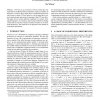Free Online Productivity Tools
i2Speak
i2Symbol
i2OCR
iTex2Img
iWeb2Print
iWeb2Shot
i2Type
iPdf2Split
iPdf2Merge
i2Bopomofo
i2Arabic
i2Style
i2Image
i2PDF
iLatex2Rtf
Sci2ools
108
Voted
ECAI
2004
Springer
2004
Springer
Consistency and Constrained Optimisation for Conditional Preferences
TCP-nets are an extension of CP-nets which allow the expression of conditional relative importance of pairs of variables. In this paper it is shown that a simple logic of conditional preferences can be used to express TCP-net orders, as well as being able to represent much stronger statements of importance than TCP-nets allow. The paper derives various sufficient conditions for a subset of the logical language to be consistent, and develops methods for finding a total order on outcomes which is consistent with the set of conditional preferences. This leads also to an approach to the problem of constrained optimisation.
Artificial Intelligence | Conditional Preferences | Conditional Relative Importance | ECAI 2004 | Various Sufficient Conditions |
| Added | 01 Jul 2010 |
| Updated | 01 Jul 2010 |
| Type | Conference |
| Year | 2004 |
| Where | ECAI |
| Authors | Nic Wilson |
Comments (0)

